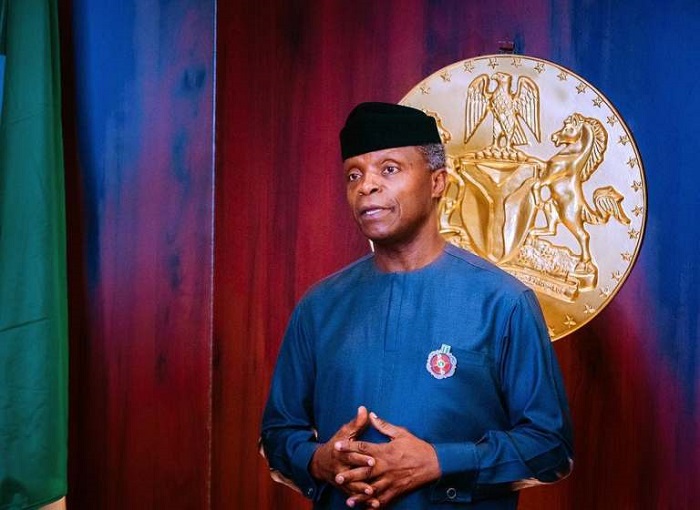Professor Yemi Osinbajo
Vice President Yemi Osinbajo has sought for wider participation of relevant stakeholders in the blue economy project to deepen participation and benefits of Nigerians from the country’s marine resources.
Osinbajo made the call at the inaugural meeting of an Expanded Committee on Sustainable Blue Economy in Nigeria in the Presidential Villa.
The Vice President said a viable blue economy project will offer vista of opportunities not only for littoral states where there are bodies of waters but for the entire country.
He identified areas to be exploited including ports, terminals, fishing, training, environment, tourism, power, oil and gas.
While identifying possible challenges of sustainability, he urged all the ministries, departments and agencies to strengthen their collaborations in an atmosphere of inter-ministerial working groups and advised all members to attend the meetings faithfully for maximum results.
Osinbajo identified the need for a legal framework that will be more robust than other international maritime conventions on blue economy which Nigeria has been signatory to.
He said the scope and participation of the committee will be further improved upon to accommodate more members from government agencies and relevant private sector stakeholders
“There is no doubt that the blue economy is a new frontier for economic development and a means of diversifying the economy through the use of resources from oceans, seas, rivers and lakes for the well-being of the people.
“It also provides positive contribution to the achievement of the Sustainable Development Goals (SDGs) 2052 Africa Integrated Maritime Strategy (2052AIM) and the UN 2030 agenda
“This concept for economic diversification is promoted by the international community and provides friendly means of livelihood in line with this administration’s agenda on job creation
“The ocean economy as an emerging economic frontier applies to ocean based industry activities and the assets, goods and services of marine ecosystems.
“Countries have to define the scope of their blue economy based on their priorities. For example, in Bangladesh, the ocean economy consists of the following broad and growing economic sectors; living resources, minerals, energy, transport trade, tourism and recreation, carbon sequestration and coastal protection. These industries and ecosystem services do not develop in isolation, but rather interact as an economic ecosystem,” Osinbajo said.
In his opening remark, the Minister of Transportation, Rotimi Amaechi said the blue economy is capable of improving government revenue, create employments and grow the gross domestic product of Nigeria.
Amaechi who was represented by the Permanent Secretary of the Federal Ministry of Transportation, Dr Magdalene Ajani, also expressed optimism in the copious benefits derivable from a well-exploited marine environment.
Aside maritime agencies like the Nigerian Ports Authority, Nigerian Maritime Administration and Safety Agency, Maritime Academy of Nigeria, the expanded committee also comprised of ten governors of coastal states including Rivers, Lagos, Delta, Akwa Ibom, Borno, Ogun, Ondo, Cross River, Bayelsa and Edo.
Other members are the Ministers of Foreign Affairs, Power, Finance, Environment, Trade and Investment, Agriculture and Water Resources, Chief of Naval Staff, Comptroller General of Customs, Lake Chad Basin Commission, Nigeria Economic Summit Group and others.


Comment here